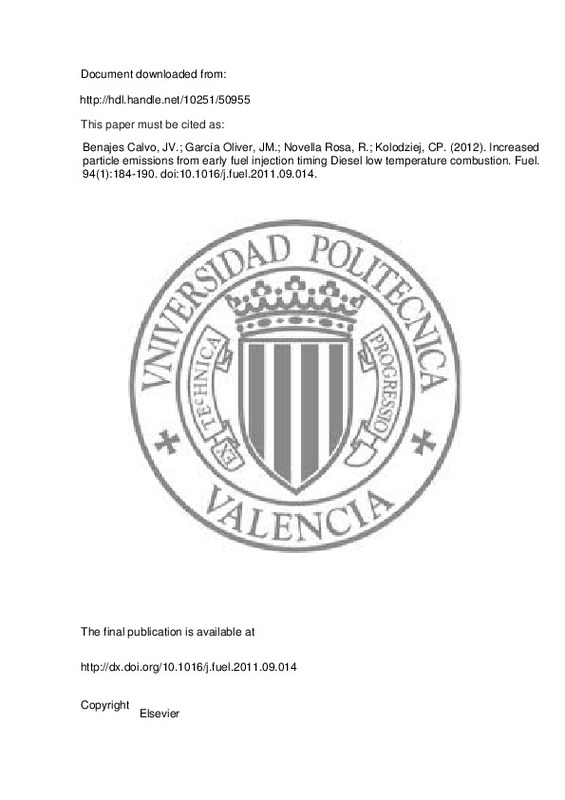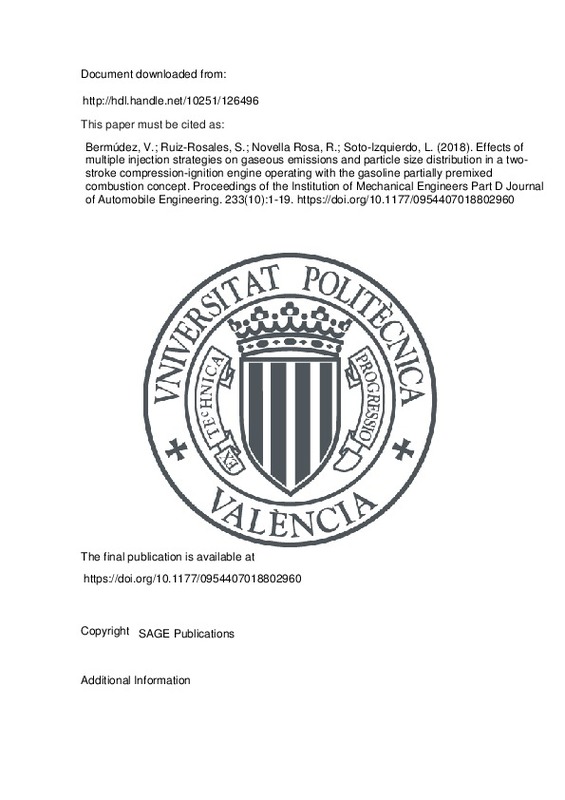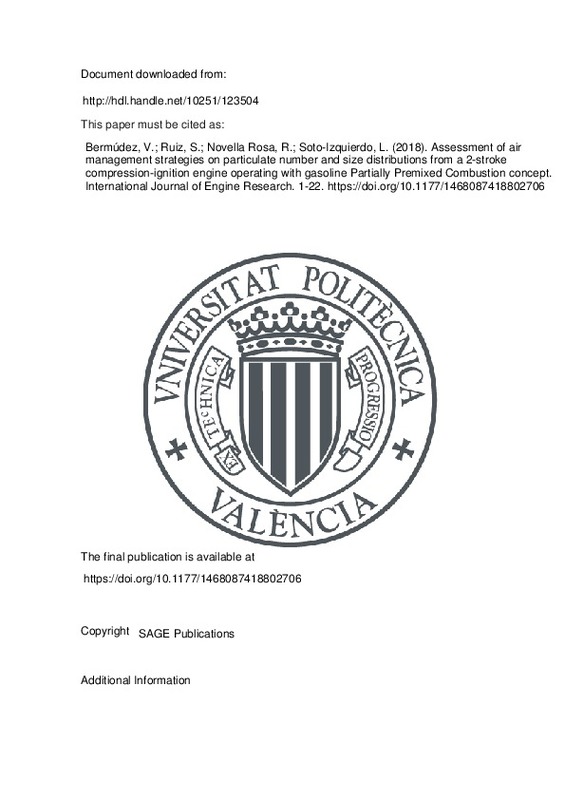JavaScript is disabled for your browser. Some features of this site may not work without it.
Buscar en RiuNet
Listar
Mi cuenta
Estadísticas
Ayuda RiuNet
Admin. UPV
Increased particle emissions from early fuel injection timing Diesel low temperature combustion
Mostrar el registro sencillo del ítem
Ficheros en el ítem
| dc.contributor.author | Benajes Calvo, Jesus Vicente
|
es_ES |
| dc.contributor.author | García Oliver, José María
|
es_ES |
| dc.contributor.author | Novella Rosa, Ricardo
|
es_ES |
| dc.contributor.author | KOLODZIEJ, CHRISTOPHER PAUL
|
es_ES |
| dc.date.accessioned | 2015-05-29T08:54:35Z | |
| dc.date.available | 2015-05-29T08:54:35Z | |
| dc.date.issued | 2012-04 | |
| dc.identifier.issn | 0016-2361 | |
| dc.identifier.uri | http://hdl.handle.net/10251/50955 | |
| dc.description.abstract | A clean premixed Diesel combustion strategy, called low temperature combustion (LTC), was able to achieve very low nitrogen oxide emissions (<35 ppm) through use of exhaust gas recirculation (12.1% inlet oxygen), and reduced particulate matter (PM) emissions (<0.05 FSN) through advanced fuel injection timing (-24°aTDC). When varying the injection timing by relatively small increments, large changes in PM mass and number emissions were measured within the premixed LTC regime. A discrepancy is investigated between expected reductions in PM emissions by simple fuel-air premixing and combustion temperature metrics, and actual PM emissions measurements when advancing the fuel injection timing earlier than -24°aTDC. For these earlier injection timings, particle numbers were seen to increase in two distinct particle size modes, whereas only one particle size mode existed at the minimum PM emissions -24°aTDC injection timing. Additional parameters from a 1D free fuel spray model were used to suggest new information that could explain the cause of these unexpected increases in PM. Using 0D and 1D calculations, the engine-out particle size and number emissions are analyzed to better understand their sensitivity to changes in the fuel injection timing within the early injection timing LTC regime. © 2011 Elsevier Ltd. All rights reserved. | es_ES |
| dc.description.sponsorship | The authors sincerely thank Gabriel Alcantarilla, Rogerio Jorge Amorim, Simon Arthozoul, and Sara Goska for their great assistance in experimental data collection and post-analysis. The authors wish to acknowledge the Generalitat Valenciana for the financial support through the project GVA PROMETEO CMT 2010 (reference code: GR001/2009/00167539). Financial support of Christopher Kolodziej's research was provided by the Spanish Ministry of Education. This publication comes from a portion of the doctoral thesis work of Christopher Kolodziej. | en_EN |
| dc.language | Inglés | es_ES |
| dc.publisher | Elsevier | es_ES |
| dc.relation.ispartof | Fuel | es_ES |
| dc.rights | Reserva de todos los derechos | es_ES |
| dc.subject | Diesel engine | es_ES |
| dc.subject | Emissions | es_ES |
| dc.subject | Low temperature combustion | es_ES |
| dc.subject | Particle | es_ES |
| dc.subject | Premixed | es_ES |
| dc.subject | Advanced fuels | es_ES |
| dc.subject | Combustion temperatures | es_ES |
| dc.subject | Diesel combustion | es_ES |
| dc.subject | Fuel injection timing | es_ES |
| dc.subject | Fuel sprays | es_ES |
| dc.subject | Injection timing | es_ES |
| dc.subject | Nitrogen oxide emissions | es_ES |
| dc.subject | Particle emissions | es_ES |
| dc.subject | Particle numbers | es_ES |
| dc.subject | Particulate matter emissions | es_ES |
| dc.subject | PM emissions | es_ES |
| dc.subject | Premixing | es_ES |
| dc.subject | Diesel engines | es_ES |
| dc.subject | Fuel injection | es_ES |
| dc.subject | Nitrogen oxides | es_ES |
| dc.subject | Particle size | es_ES |
| dc.subject | Particles (particulate matter) | es_ES |
| dc.subject | Particulate emissions | es_ES |
| dc.subject | Temperature | es_ES |
| dc.subject | Combustion | es_ES |
| dc.subject.classification | MAQUINAS Y MOTORES TERMICOS | es_ES |
| dc.title | Increased particle emissions from early fuel injection timing Diesel low temperature combustion | es_ES |
| dc.type | Artículo | es_ES |
| dc.identifier.doi | 10.1016/j.fuel.2011.09.014 | |
| dc.relation.projectID | info:eu-repo/grantAgreement/GVA//GR001%2F2009%2F00167539/ | es_ES |
| dc.rights.accessRights | Abierto | es_ES |
| dc.contributor.affiliation | Universitat Politècnica de València. Instituto Universitario CMT-Motores Térmicos - Institut Universitari CMT-Motors Tèrmics | es_ES |
| dc.contributor.affiliation | Universitat Politècnica de València. Departamento de Máquinas y Motores Térmicos - Departament de Màquines i Motors Tèrmics | es_ES |
| dc.description.bibliographicCitation | Benajes Calvo, JV.; García Oliver, JM.; Novella Rosa, R.; Kolodziej, CP. (2012). Increased particle emissions from early fuel injection timing Diesel low temperature combustion. Fuel. 94(1):184-190. https://doi.org/10.1016/j.fuel.2011.09.014 | es_ES |
| dc.description.accrualMethod | S | es_ES |
| dc.relation.publisherversion | http://dx.doi.org/10.1016/j.fuel.2011.09.014 | es_ES |
| dc.description.upvformatpinicio | 184 | es_ES |
| dc.description.upvformatpfin | 190 | es_ES |
| dc.type.version | info:eu-repo/semantics/publishedVersion | es_ES |
| dc.description.volume | 94 | es_ES |
| dc.description.issue | 1 | es_ES |
| dc.relation.senia | 212543 | |
| dc.contributor.funder | Generalitat Valenciana | es_ES |
| dc.contributor.funder | Ministerio de Educación | es_ES |







![[Cerrado]](/themes/UPV/images/candado.png)



